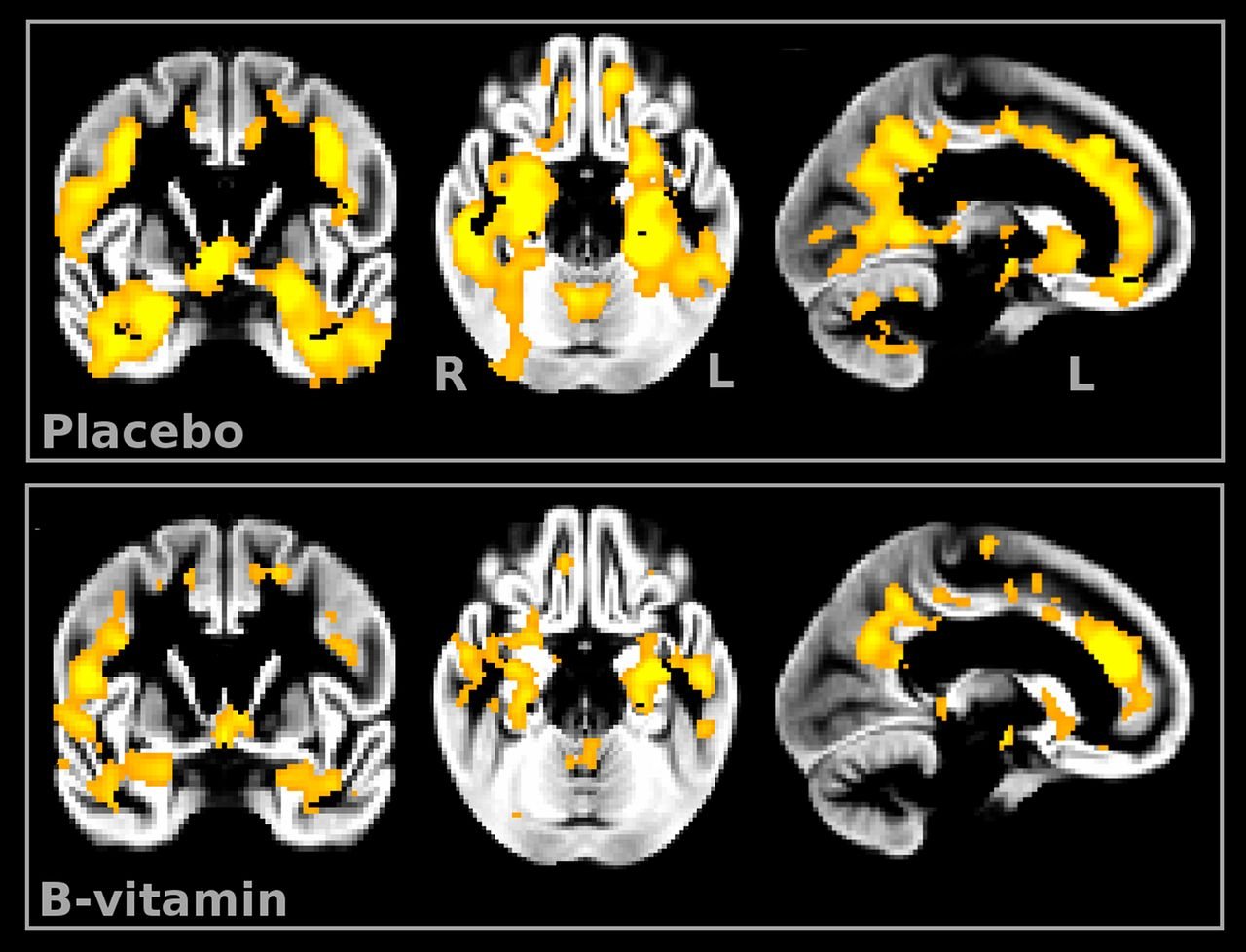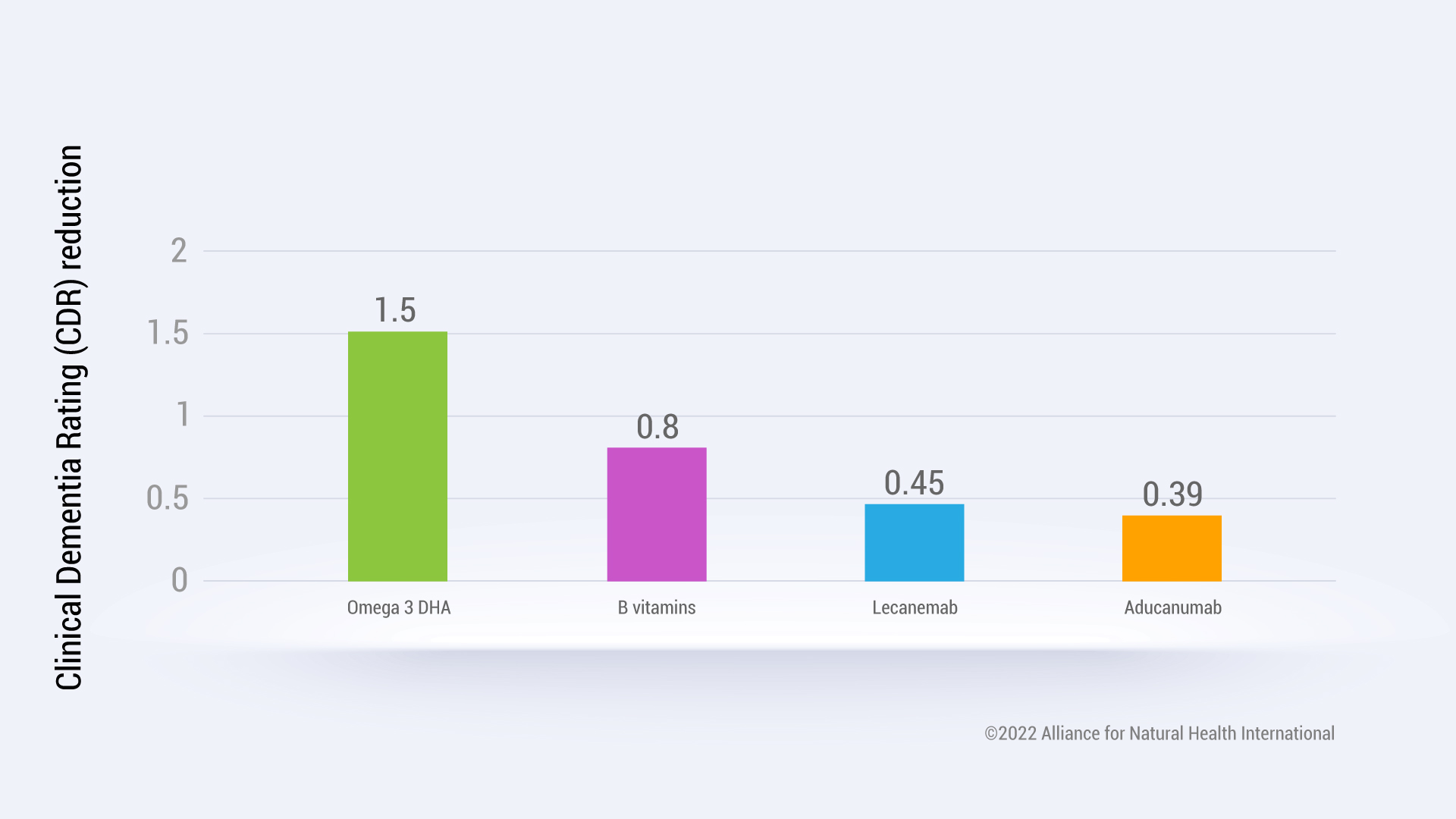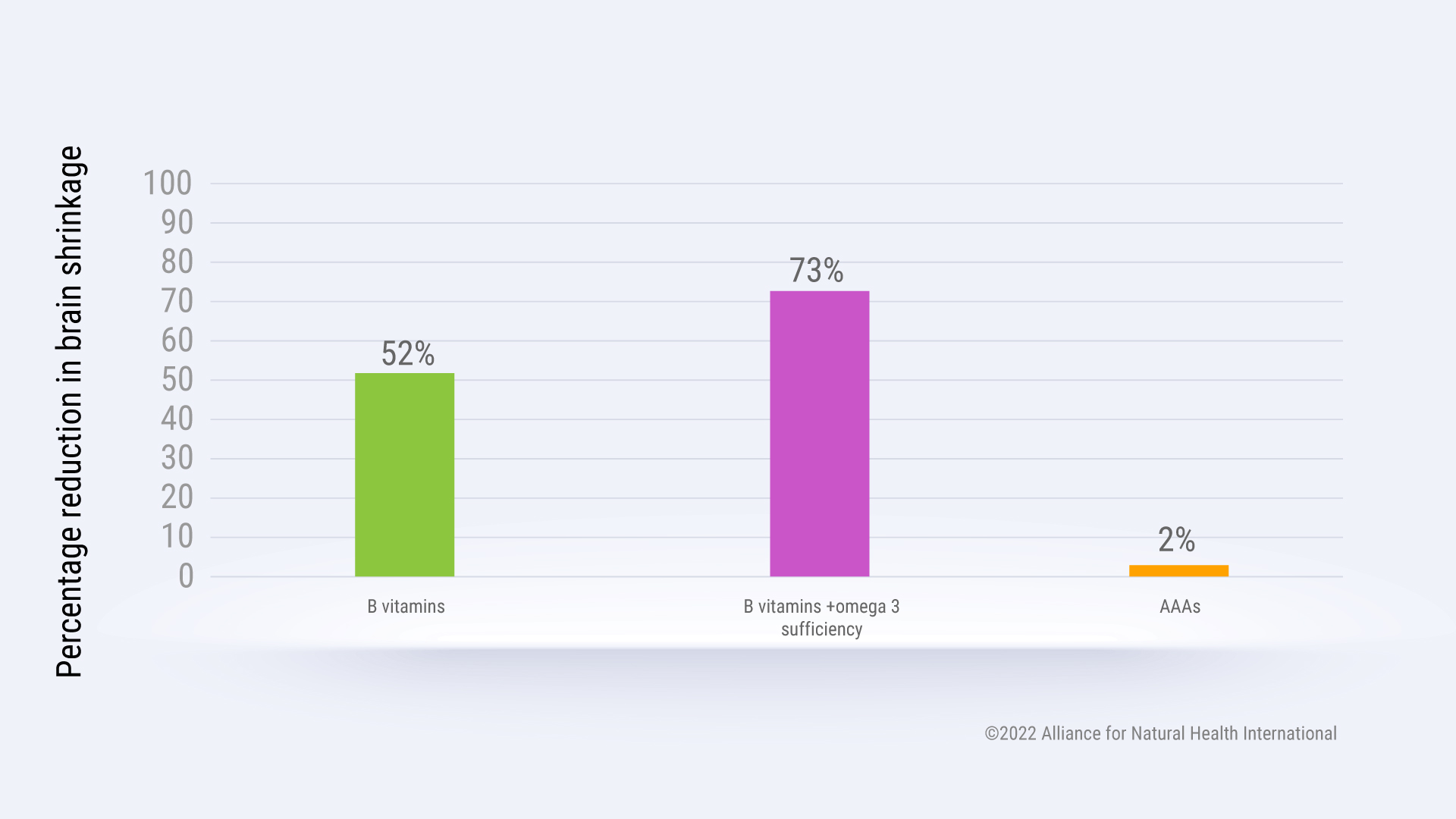Content Sections
- ● Increasing Alzheimer’s patients and patents
- ● Chasing the tail
- ● A natural, low cost, highly effective, alternative for early treatment of AD
- ● Why is prevention being ignored?
- ● Putting it into practice
- ● Food first
- ● Watch Rob and Patrick’s interview
- ● Watch Patrick’s presentation on using B vitamins and omega-3’s to prevent Alzheimer’s disease
Newspapers have been littered in recent days with hyped up headlines over the new Alzheimer’s drug, lecanemab. What the reports don’t say, is that the results are far from spectacular and such drugs come with a dreadful cost in the form of serious adverse effects that include brain swelling and haemorrhage. But with an estimated 55 million people living with Alzheimer’s globally, and nearly 10 million new cases developing each year, there’re big bucks to be made.
Anti-amyloid antibodies (AAAs), hailed as breakthrough treatments for slowing disease progression are being fast-tracked through drug regulators, sometimes against the advice of Advisory Committees, as in the case of aducanumab, which failed in clinical trials. The newest offering, also from the Biogen stable, lecanemab, despite showing a modest benefit, is also attracting scepticism and concern over its claims of effectiveness.
It’s against this background that the Food for the Brain Foundation has launched its ‘Alzheimer’s is Preventable’ campaign.
>>> Read the Food for the Brain Foundation’s press release
Increasing Alzheimer’s patients and patents
In 2007, an estimated 26.6 million people were living with Alzheimer’s disease (AD) globally. Today, the number has doubled and it’s expected to triple by 2050. The pressure is on for Big Pharma to come up with a solution. A very lucrative one at that given the value of the global Alzheimer’s therapeutics market which is predicted to grow in value by nearly 10% by 2026 as disease rates spiral.
Chasing the tail
In their desperation to find a ‘magic cure’ for AD, mainstream researchers have been chasing their tails by doggedly focusing on targeting amyloid plaques and tau proteins, a theory now being called into question. As Patrick Holford remarked in a recent Facebook post discussing the number of failed studies for drugs targeting amyloid plaques in the brain “…if you test a theory 300 times and it fails 300 times you discard the theory.”
New research published in Molecular Psychiatry continues the focus on genetic predisposition by sharing the discovery of a new microprotein called SCHMOOSE, which is being linked to a 30% increased risk of AD. Unsurprisingly, it also provides a new drug target.
Emerging from the shadows of the past few decades comes a more realistic view of AD. That the amyloid plaques that are indicative of AD are the result of an autoimmune reaction against bacteria and toxins that cross the blood-brain barrier.

A natural, low cost, highly effective, alternative for early treatment of AD
What’s now clear scientifically is that AD is a complex disease state involving multiple factors and processes. These include insulin resistance, hence AD sometimes being referred to as type 3 diabetes, and autoimmunity. A multi-factorial disease requires a multi-factorial approach rather than a unilateral one, this being especially problematic if the single mechanism being focused on is questionable.
Despite the lack of recognition by mainstream doctors, the most well evidenced and effective treatment for AD involves changes in diet and lifestyle along with supplementation, specifically with B vitamins and omega-3 fish oils. This natural treatment needs to be applied before full-blown AD pathology is established and when homocysteine rises sufficiently as a marker of cognitive impairment.
The same approach can also improve an individual’s brain function, significantly. Supplementation with high dose B vitamins has previously been shown to benefit brain health (Fig. 1), but when combined with omega 3 oils with a high DHA content (at least 50%), the benefits are nothing less than spectacular.

Figure 1. Comparison of grey matter loss between placebo and B vitamin groups. Source: Douaud G, Refsum H, de Jager CA, et al. Proc Natl Acad Sci U S A. 2013 Jun 4;110(23):9523-8.
When it comes to measuring clinical improvement, the Clinical Dementia Rating (CDR) is a widely used metric. Results from clinical studies of patients taking omega 3 supplements who had a sufficient levels of B vitamins saw a marked reduction in CDR, measured by the CDR sum of boxes (CDR-SB), of 1.5 points. Lecanemab achieved a reduction of 0.45, which was only marginally higher than Aducanumab at 0.39.

Figure 2. Comparison of Clinical Dementia Rating (CDR) reduction between synergistic B vitamin/Omega-3 supplementation and two AAA drugs. Sources: Oulhaj A, Jernerén F, Refsum H, et al. J Alzheimers Dis. 2016;50(2):547-57; Eisai press release; Tampi RR, Forester BP, Agronin M. Drugs Context. 2021 Oct 4;10:2021-7-3; Jernerén F, Cederholm T, Refsum H, et al. J Alzheimers Dis. 2019;69(1):189-197.
The synergistic combination of omega-3 supplements alongside the high dose B vitamins is a game changer for AD prevention when AD is in its early, prodromal stage, when the first signs of cognitive impairment are noted. The combination has been found to reduce brain shrinkage by up to 73% whereas the best the AAAs could manage was a paltry 2%.

Figure 3. Reduction in brain shrinkage B vitamins and omega 3 vs AAAs. Sources: Jernerén F, Elshorbagy AK, Oulhaj A, et al. Am J Clin Nutr. 2015 Jul;102(1):215-21; Schwarz AJ, Sundell KL, Charil A, et al. Alzheimers Dement (N Y). 2019 Jul 30;5:328-337; Smith AD, Smith SM, de Jager CA, et al. PLoS One. 2010;5(9):e12244.
Studies from The Netherlands, France and China have shown similar findings, that the combination of higher doses of B vitamins with omega-3 fats result in clear improvements in cognitive function. These being far better than anything achieved by AAA drugs, without the high financial costs or serious negative health impacts. Not only that, taking the ‘B-road’ can also mitigate risk factors associated with genetic predisposition.
Compared with the AAA treatments currently on offer, taking a preventative approach using natural methods offers a range of additional benefits such as lower risk of developing diabetes, heart disease, improved energy, sleep, weight control and, of course, improved brain health.
Why is prevention being ignored?
It is hard to find any reason, other than it not suiting Big Pharma’s business with disease model, for the lack of airtime, especially during the education or continuing professional development of medical doctors, for micronutrient solutions. How many times have you heard this: There’s no big money to be made out of naturally occurring nutrients because they can’t be patented. Without a patent, you can’t create a blockbuster drug market. Not to mention the elephant in the room that if everyone was healthy, the industry that’s grown up to exploit an ever more chronic and degenerative diseased population would have a much reduced market.
Putting it into practice
If you are over 50, we strongly recommend you take the Food for the Brain Foundation’s free validated online Cognitive function test followed by a Dementia Risk Index questionnaire to:
- Find out where you are on the cognitive function scale
- Learn the most important dietary and lifestyle actions you can take
- Take control of your mental wellbeing
- Contribute to the Food for the Brain research process
- Find out if you’d benefit from taking high dose B vitamins and Omega 3 essential fatty acids.
Should you require these micronutrients, suggested daily dosing, as used in successful clinical trials, is as follows:
- 20 mg vitamin B6 e.g. as pyridoxine hydrochloride or pyridoxal-5’phosphate (1429% of the Nutrient Reference Value, or NRV)
- 5000 mcg vitamin B12 e.g. as methylcobalamin, hydroxocobalamin, 5’deoxyadenosylcobalamin (20,000% of the NRV). At ANH we recommend a higher dose of vitamin B12 than Prof Smith's study in the form of methycobalamin lozenges due to the fact that many people suffer from malabsorption
- 800 mcg folate (e.g. methyltetrahydrofolate, glucosamine or calcium bound) (400% of the NRV)
- Two soft capsules once a day containing 400mg docosahexaenoic acid (DHA) and up to 112.5mg of eicosapentaenoic acid (EPA) per capsule
Note: Vegetarians and vegans may use DHA-rich algal sources of Omega-3 fatty acids.
Food first
Remember, long-term health isn’t just about supplements. Underpinning all long-term health maintenance or regenerative strategies is consistent healthy eating and a healthy lifestyle. Reset your metabolic health with our RESET EATING approach that will help you to learn how, what and when to eat, in the process, turning your food into powerful medicine that will nourish and protect your brain, as well as the rest of your body.
Watch Rob and Patrick’s interview
Watch Patrick’s presentation on using B vitamins and omega-3’s to prevent Alzheimer’s disease
Sign up to the Food for the Brain Foundation’s Masterclass for Health Practitioners
On 1st November there is a Masterclass of leading world experts explaining why Alzheimer’s really is preventable.
Join the Upgrade Your Brain Webinar
On 3 November 2022, you can join Patrick Holford's Upgrade Your Brain webinar.
Further reading
Muteness on B vitamins and lifestyle after pharma's flop
>>> Food for the Brain press release: Alzheimer’s: Why prevention is better than drugs – but less profitable
>>> Buy your copy of RESET EATING
>>> Feel free to republish - just follow our Alliance for Natural Health International Re-publishing Guidelines
>>> If you’re not already signed up for our weekly newsletter, sign up for free now using the SUBSCRIBE button at the top of our website – or better still – become a Pathfinder member and enjoy benefits unique to our members.
>>> Return to the homepage
Proudly affiliated with: Enough Movement









Comments
your voice counts
10 October 2022 at 9:59 am
I remember hearing about a study that was done many years ago to test the theory of amyloid plaques being the cause of Alzheimers. They studied paired groups of people where one of the pair suffered alzheimers and the other didn't to check for the amount of amyloid plaques present. Generally they were either couples/spouses (who shared similar diet/lifestyle factors), or close siblings (assumed to potentially have a similar genetic pre-disposition). In almost all cases they found the non-alzheimer-affected participant had had as many if not more plaques as their matched alzheimer-affected participant. Their conclusion was that the amyloid plaques had nothing to do with alzheimers. I wish I had a copy of the study.
At that time I thought that should have put the bed the drug research focussed on amyloid plaques - but I suppose, just like cholesterol it's a convenient marker they can target to to monitor to show "success" in treating the disease - even if it really has nothing to do with it.
10 October 2022 at 6:54 pm
What an enlightening article on Alzheimer’s. Our family are very much natural health oriented. Having just returned from a funeral for a very dear friend who descended into the hell of Alzheimer’s this article is very much appreciated. Thank you for this very helpful information. Knowing that there really is something that can be done and knowing our risks is wonderful.
18 October 2022 at 11:12 am
We inherited my father after my Mom died and he had an advanced alzheimers then and a major depression. He used to sleep for 16 hours/day and then just sat around the house. Would hardly eat anything.
When he came to live with us, we were fully raw so he automatically got the same food.
Within a week he started saying how beautiful the world is, started eating like a horse and within 3 months he was sleeping 8 hours/day and was able to take himself to the beach (about 300 meters) and come back. He had extremely smelly stools for about 3 months so I think he was detoxing.
He had wonderful 5 years on raw food, did not take any medication apart from supplements.
Then, I was getting a bit overwhelmed at being a carer, so we started putting him into respite to give me a break. He started deteriorating again and within 2 years he got worse quickly and passed away.
Food makes all the difference!
21 May 2023 at 6:56 pm
I think there's a typo in the amount for B12 quoted. You are saying 5,000 mcg, but the trial by Prof. David Smith used 500 mcg.
22 May 2023 at 12:05 pm
Hello Angela
Thanks so much for your comment. You're correct that Prof Smith used 500 mcg of vitamin B12. However, at ANH we recommend a higher dose of vitamin B12 than Prof Smith's study in the form of methycobalamin lozenges due to the fact that many people suffer from malabsorption.
08 August 2024 at 1:16 pm
Wouldn't it be better to monitor serum levels (total or active b12) instead? For example, my wife & I supplement a daily b complex incl 400mcg b12. My serum levels are 70% & 37% through range for total & active and my wife's total is 85% t/r.
Your voice counts
We welcome your comments and are very interested in your point of view, but we ask that you keep them relevant to the article, that they be civil and without commercial links. All comments are moderated prior to being published. We reserve the right to edit or not publish comments that we consider abusive or offensive.
There is extra content here from a third party provider. You will be unable to see this content unless you agree to allow Content Cookies. Cookie Preferences